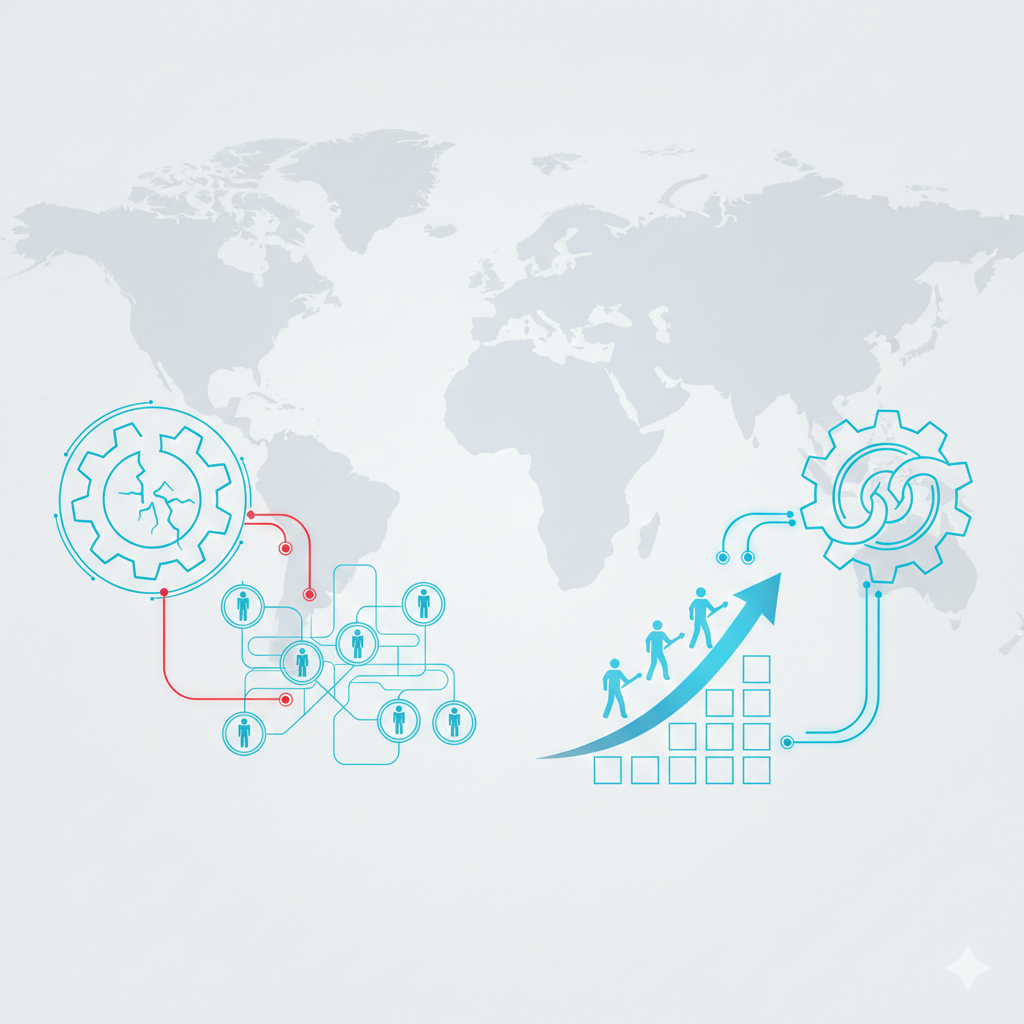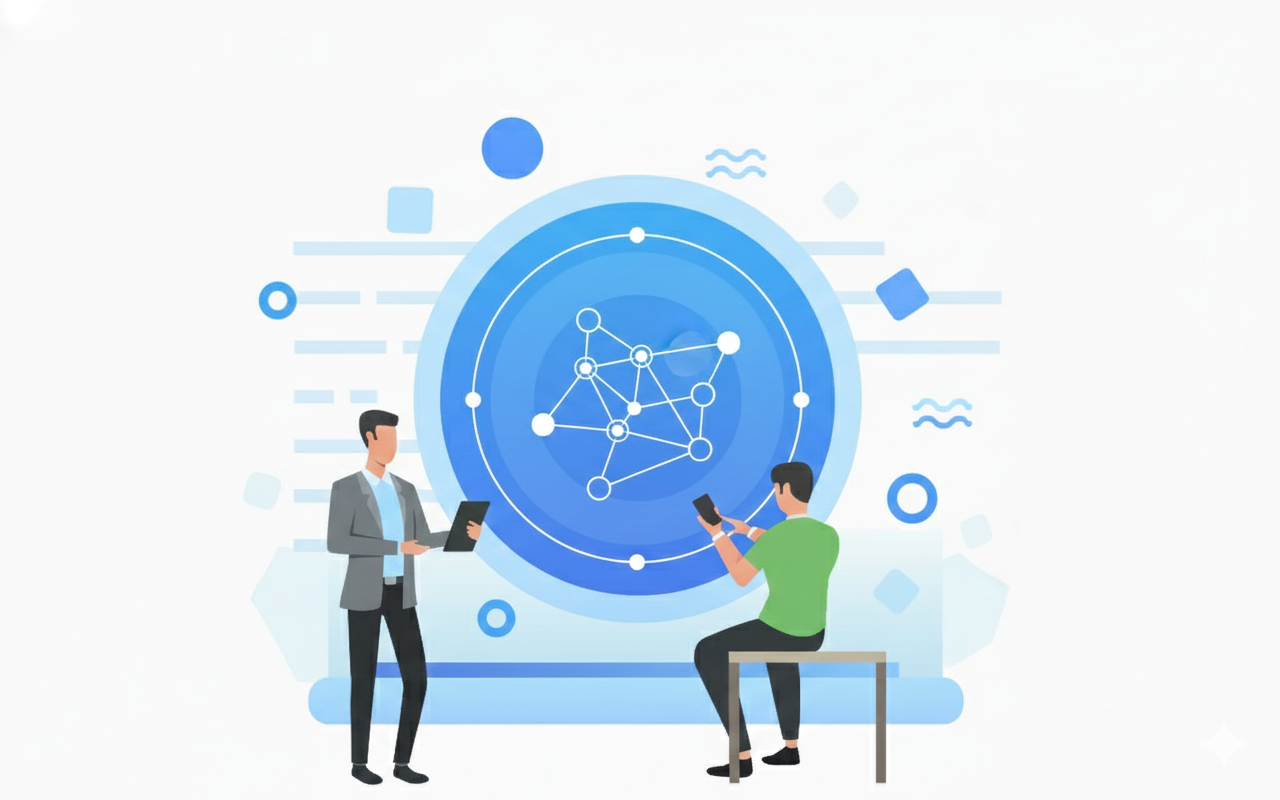

AI agents will not replace recruiters entirely, but will transform recruitment through hybrid models combining AI efficiency with human expertise. While AI agents excel at data processing, screening, and routine tasks, human recruiters remain essential for relationship-building, cultural fit assessment, and strategic talent planning that require emotional intelligence and nuanced judgment.
The future of recruitment lies in AI-augmented workflows where technology handles administrative tasks while recruiters focus on high-value activities. Organizations using platforms like impress.ai achieve 75% reductions in shortlisting time while maintaining human oversight for complex hiring decisions. This collaborative approach maximizes both technological efficiency and human insight, creating superior outcomes that neither pure automation nor traditional methods could achieve alone.
The recruitment industry’s transformation centers on partnership rather than replacement, where AI agents and human recruiters collaborate to create more effective, efficient, and engaging hiring experiences for both organizations and candidates.
No, AI agents will augment rather than replace recruiters, handling routine tasks while humans focus on relationship-building and strategic decisions.
AI recruitment agents have achieved remarkable sophistication in handling data-intensive tasks that traditionally consumed significant recruiter time. These systems can process thousands of applications simultaneously, parsing CVs with precision and matching candidates to job requirements using complex algorithms that consider multiple variables beyond simple keyword matching. Modern platforms, such as Impress.ai’s Resume Scoring and Ranking system, demonstrate this capability by automatically analyzing resumes against job requirements while providing transparency about which skills and keywords contribute to candidate rankings.
The efficiency gains from these capabilities are substantial, with organisations reporting dramatic improvements in their hiring metrics. Companies using AI-powered recruitment automation platforms consistently achieve faster time-to-hire, improved quality of shortlisted candidates, and enhanced consistency in evaluation processes. These systems operate continuously without fatigue, maintaining consistent evaluation standards across all applications regardless of volume or timing. The data-driven approach eliminates many subjective inconsistencies that can occur in manual screening processes.
However, current AI capabilities remain bound by their programming and training data. While these systems excel at pattern recognition and statistical analysis, they struggle with contextual understanding, cultural nuances, and the complex human factors that influence hiring success. Understanding these limitations is crucial for organisations seeking to implement AI recruitment solutions effectively while maintaining the human elements that create exceptional hiring outcomes and positive candidate experiences.
AI-powered screening systems have revolutionized the initial stages of recruitment by automatically evaluating candidate qualifications against predefined criteria. These systems employ sophisticated natural language processing to extract relevant information from CVs regardless of format, creating standardized profiles that facilitate objective comparison. Platforms like impress.ai’s Resume Screening solution utilize proprietary algorithms that score and rank candidates in real-time, considering factors such as work experience, education, and skills to rapidly identify qualified applicants.
The assessment capabilities extend beyond simple CV analysis to include automated skills testing, behavioral evaluations, and even initial video interview analysis. These systems can conduct structured assessments that evaluate both technical competencies and soft skills, providing consistent evaluation frameworks across all candidates. The most advanced platforms generate detailed analytics about candidate performance, identifying patterns and insights that help refine future screening processes. However, human oversight remains essential for ensuring these automated assessments align with organizational values and accurately reflect the nuances of specific roles and team dynamics.
Conversational AI has transformed candidate engagement by providing immediate, personalized responses to inquiries and guiding applicants through application processes. Systems like impress.ai’s self-learning FAQ engines achieve 90%+ auto-answer rates, addressing candidate questions around the clock and ensuring consistent information delivery. These virtual assistants can collect preliminary information, explain job requirements, and even conduct basic screening interviews using natural dialogue rather than static forms.
While these conversational systems excel at handling routine inquiries and providing information, they face limitations in understanding complex career motivations, addressing unique circumstances, or building the trust that comes from authentic human interaction. The most effective implementations combine AI efficiency with clear pathways to human recruiters for situations requiring empathy, complex problem-solving, or relationship building that remain beyond current AI capabilities.
Despite remarkable technological advances, certain aspects of recruitment remain fundamentally human endeavors that AI cannot authentically replicate. The most critical limitation lies in emotional intelligence and the ability to build genuine relationships based on trust, understanding, and shared goals. Human recruiters excel at reading between the lines of candidate responses, understanding career aspirations that aren’t explicitly stated, and recognizing potential that may not be immediately apparent from standardized assessments.
Complex decision-making in recruitment often requires weighing intangible factors that resist algorithmic quantification. Experienced recruiters consider organizational dynamics, team chemistry, leadership potential, and cultural evolution in ways that go far beyond matching skills to job descriptions. They understand that the best hire isn’t always the highest-scoring candidate on paper, but rather the person who will thrive in a specific environment and contribute to long-term organizational success.
Strategic thinking represents another uniquely human contribution to recruitment success. While AI systems excel at processing current data, human recruiters provide forward-looking insights about talent market trends, anticipate future skill requirements, and develop recruitment strategies that align with evolving business needs. This strategic perspective, combined with the ability to build lasting professional relationships, creates value that extends far beyond individual hiring decisions to influence overall talent acquisition success.
The foundation of successful recruitment lies in building authentic relationships with both candidates and hiring managers based on mutual trust and understanding. Human recruiters create these connections through personal interaction, demonstrating genuine interest in career development, and providing honest guidance about opportunities and challenges. This relationship-building extends beyond transactional exchanges to encompass career counseling, industry insights, and long-term professional support that candidates value highly.
Trust development requires consistency, transparency, and the ability to navigate sensitive conversations about career changes, salary expectations, and personal circumstances. Experienced recruiters understand how to balance candidate aspirations with organizational realities, providing guidance that serves both parties’ long-term interests. These relationships often extend beyond individual hiring transactions to create ongoing professional networks that benefit both recruiters and candidates throughout their careers.
Evaluating cultural fit requires a sophisticated understanding of organizational dynamics, unwritten rules, and interpersonal compatibility that goes far beyond algorithmic matching. Human recruiters assess cultural alignment through subtle behavioral cues, communication styles, and responses to hypothetical scenarios that reveal how candidates might function within specific team environments. This assessment considers not just current culture but also cultural evolution and the type of personalities that will contribute positively to organizational growth.
Cultural fit evaluation also requires understanding the nuanced differences between teams, departments, and leadership styles within organizations. A candidate who might thrive in one department could struggle in another, and experienced recruiters recognize these distinctions through their deep understanding of organizational complexity that AI systems cannot replicate.
Human recruiters provide strategic value through their understanding of talent market dynamics, compensation trends, and competitive intelligence that informs hiring strategies. This market knowledge comes from building relationships across industries, understanding career progression patterns, and recognizing emerging skill requirements before they become widely apparent. Experienced recruiters anticipate talent shortages, identify new sourcing channels, and advise on workforce planning strategies that align with business objectives.
This strategic perspective includes understanding the broader implications of hiring decisions on team dynamics, organizational culture, and long-term capability development. Human recruiters can advise on building diverse teams, developing internal talent pipelines, and creating employment value propositions that attract top performers in competitive markets. These insights require contextual understanding and relationship networks that AI systems cannot independently develop.
The future of recruitment is emerging as a powerful collaboration between AI efficiency and human expertise, where each contributes their strongest capabilities to create superior outcomes. Progressive organizations are implementing hybrid models where AI agents handle data-intensive tasks, routine communications, and initial candidate processing, while human recruiters focus on relationship building, strategic decision-making, and complex assessment activities that require emotional intelligence and contextual understanding.
This collaborative approach maximizes the benefits of both AI and human capabilities while mitigating their respective limitations. AI systems provide consistency, speed, and data-driven insights that enhance decision-making quality, while human recruiters contribute strategic thinking, relationship management, and the nuanced judgment required for complex hiring decisions. The most successful implementations create seamless workflows where technology amplifies human capabilities rather than competing with them.
Organizations adopting these hybrid approaches report significant improvements in both efficiency metrics and hiring quality. By allowing AI to eliminate routine tasks and provide data-driven insights, recruiters can dedicate more time to high-value activities like candidate counseling, stakeholder management, and strategic talent planning. This enhanced focus on uniquely human contributions creates competitive advantages in attracting top talent and building strong employment brands that resonate with candidates seeking meaningful professional relationships.
The evolution toward hybrid recruitment models also addresses candidate preferences for technology-enabled efficiency combined with human touch points at critical moments. Candidates appreciate the convenience and responsiveness of AI-powered interactions while valuing human guidance for important career decisions. This balanced approach creates optimal candidate experiences that leverage the best aspects of both technological innovation and human expertise.
Optimal task allocation in hybrid recruitment models assigns data processing, initial screening, and routine communications to AI systems while reserving relationship building, final assessments, and strategic decisions for human recruiters. AI excels at parsing applications, conducting preliminary skills assessments, scheduling interviews, and managing candidate communications according to predefined workflows. These automated processes ensure consistent candidate treatment while freeing recruiters to focus on activities requiring human judgment and interpersonal skills.
Human recruiters concentrate on tasks that benefit from emotional intelligence, industry knowledge, and relationship-building capabilities. This includes conducting in-depth interviews, assessing cultural fit, providing career guidance, managing stakeholder relationships, and making final hiring recommendations based on a comprehensive evaluation of both quantitative and qualitative factors. The division creates efficient workflows where each component contributes its strongest capabilities to overall recruitment success.
AI support dramatically amplifies recruiter productivity by eliminating time-consuming administrative tasks and providing data-driven insights that inform decision-making. Platforms like impress.ai’s Automated Interview Scheduling eliminate the back-and-forth communications traditionally required for coordinating interviews, while intelligent candidate matching systems surface qualified candidates who might otherwise be overlooked in large applicant pools. This automation allows recruiters to process significantly more positions while maintaining or improving hiring quality.
Enhanced productivity also comes from AI-generated insights about candidate performance, market trends, and recruitment process effectiveness. These analytics help recruiters identify successful patterns, optimize their approaches, and make more informed decisions about sourcing strategies and candidate evaluation. The combination of reduced administrative burden and enhanced decision-making capabilities enables recruiters to handle larger portfolios while delivering superior results for both candidates and hiring organizations.
As recruitment becomes increasingly technology-enabled, successful recruiters must develop new competencies that complement AI capabilities while emphasizing uniquely human strengths. Technology literacy has become essential, requiring an understanding of how AI systems function, the ability to interpret algorithmic recommendations, and skills in optimizing platform performance. However, technical proficiency alone is insufficient; recruiters must also enhance their interpersonal abilities to provide value that AI cannot deliver.
The most successful recruiters in AI-augmented environments combine technical competency with advanced relationship management skills, strategic thinking abilities, and deep industry knowledge. They understand how to leverage AI insights while maintaining the human connections that drive exceptional recruitment outcomes. This evolution requires continuous learning and adaptation as technology capabilities advance and candidate expectations evolve.
Professional development for recruiters now encompasses both technical training on AI platforms and enhancement of soft skills that create differentiated value. Organizations investing in comprehensive upskilling programs report higher recruiter satisfaction, improved performance metrics, and better retention of top recruitment talent. The most effective development approaches combine hands-on platform training with coaching on advanced interpersonal skills, strategic thinking, and industry expertise that enable recruiters to thrive in technology-enhanced environments.
Modern recruiters require a fundamental understanding of AI platform capabilities, limitations, and optimization strategies to effectively leverage these tools. This includes proficiency in configuring screening parameters, interpreting candidate scoring algorithms, and understanding when human intervention is necessary to ensure fair and accurate assessments. Recruiters must also develop skills in analyzing AI-generated insights and translating algorithmic recommendations into actionable hiring strategies that align with organizational objectives.
Effective AI collaboration requires understanding how to provide feedback that improves system performance over time, recognizing patterns that indicate potential bias or errors, and maintaining oversight of automated processes to ensure they deliver intended outcomes. This technical literacy enables recruiters to maximize the benefits of platforms like impress.ai while maintaining quality control and ensuring alignment with organizational values and hiring goals.
As AI handles routine interactions, human recruiters must excel in complex interpersonal situations that require empathy, active listening, and sophisticated communication skills. This includes career counseling capabilities that help candidates navigate professional transitions, negotiation skills for managing complex offer situations, and relationship management abilities that build long-term professional networks extending beyond individual hiring transactions.
Advanced interpersonal skills also encompass cultural competency for working with diverse candidate populations, emotional intelligence for reading subtle behavioral cues during interviews, and consultative abilities for advising hiring managers on talent strategy and team development. These enhanced capabilities position recruiters as strategic partners rather than administrative coordinators, creating sustainable value in an increasingly automated recruitment landscape.
The recruitment industry’s future lies not in the replacement of human expertise by AI agents, but in the powerful synthesis of technological efficiency with human insight and relationship-building capabilities. Organizations that successfully integrate AI-powered platforms like impress.ai with skilled human recruiters will achieve the best outcomes, combining data-driven efficiency with the emotional intelligence and strategic thinking that drive exceptional hiring decisions. As this hybrid model becomes the standard, recruiters who develop both technical proficiency and enhanced interpersonal skills will find themselves more valuable than ever, positioned as strategic partners who leverage AI capabilities while providing uniquely human contributions that candidates and hiring organizations increasingly value.
Q: Can AI agents fully replace recruiters in the hiring process?
A: No, while AI agents handle routine tasks and data analysis efficiently, human recruiters remain essential for relationship-building, nuanced judgment, and strategic talent planning.
Q: How does impress.ai enhance recruiter productivity compared to traditional methods?
A: impress.ai automates shortlisting, interview scheduling, and candidate screening, enabling recruiters to focus on high-value tasks and process more roles with improved quality.
Q: What aspects of recruitment are still better handled by humans than AI?
A: Assessing cultural fit, building trust, and providing career counseling are uniquely human strengths that AI cannot authentically replicate.
Q: Is using AI in recruitment likely to improve candidate experience?
A: Yes, AI-powered platforms offer fast responses and consistent information, but candidates still value human guidance for complex career decisions.
Q: What skills do recruiters need to thrive in an AI-augmented recruitment environment?
A: Recruiters need technology literacy to leverage AI tools, along with advanced interpersonal and strategic skills to provide value beyond automation.
Q: How do hybrid recruitment models distribute tasks between AI agents and human recruiters?
A: AI systems handle data processing and routine communications, while human recruiters focus on interviews, relationship management, and final hiring decisions.
Q: Are there any risks to relying too much on AI for recruitment decisions?
A: Overreliance on AI can lead to missed nuances in candidate potential and cultural fit, so human oversight is crucial for fair and accurate hiring outcomes.
Thanks for your interest! We'll get back to you soon


A unified AI platform constructed for recruiters, employers, businesses and people
Request Demo

